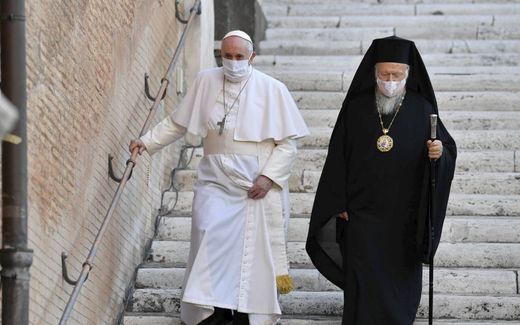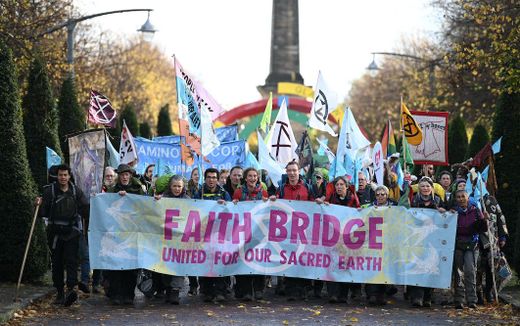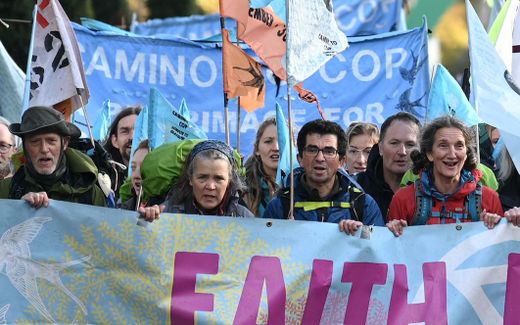Money always wins, even in the climate crisis, says Egbert Schuurman
08-01-2022
Opinion
Klaas van der Zwaag, RD

Money always wins, even during the climate crisis. Photo EPA, Matthias Balk
Opinion
The current debate on climate is a confluence of the decades-long debate on the environment, says Dutch Prof. Egbert Schuurman. “The underlying cause is the power of the economy, driven by technology and science. But money is the driving cause. Money is the great evil in the world. Money always wins.”
Prof. Schuurman (84) has regularly addressed topical issues in politics, science and society as a philosopher of technology and a Senator on behalf of the ChristenUnie (Christian Union). His works on the disastrous impact of technology on creation have been translated into various languages, most recently Portuguese and Spanish, and previously Chinese and English.
The emeritus professor in Delft and Amsterdam still follows the discussions on climate and environment intensively and has done so for decades. In 1974, he wrote an article in “De aarde is er ook nog” (There is the earth also). The back cover states that humanity faces “the life-size problem of environmental catastrophe”. Have times changed? Prof. Schuurman: “I wrote about the religious backgrounds of the environmental problem. I received a response from several theologians. One of the theology students wrote a thesis about it as a result of that article. Otherwise, there was no attention.”
In other words: you were crying in the wilderness?
“I still do. In 2002, I was a delegate to the second UN conference on environment and climate in Johannesburg. However, there was no discussion on the backgrounds and causes. My life’s work has always been about reflecting on technology. Modern technology is abstract science and separates man from nature. The powers of science, technology and economics have an increasing influence on culture. The result is the many cultural problems of today, among which the climate crisis is the most striking. The so-called “God is dead”-theology has broken down much resistance among Christians, and culture is secularising at a rapid pace under the influence of techno-economic development.”
Bible-believing Christians had little interest in the questions of the environment and the management of the earth. Why did they leave this to so-called left-wing Christians?
“In Reformed circles, reality, including nature, was fully recognised as God’s creation. Tacitly, and not even aware of the unbiblical view of nature, they subscribed to the prevailing cultural developments in industry and agriculture. In general, students from Reformed circles chose the direction of technology. That could do the least harm.
Initially, there was resistance in agricultural circuits against the industrialisation of arable farming and cattle breeding. Now, fifty years later, farmers have even become its advocates. In those days, from 1972 to 1990, I spoke a lot for the Dutch Christian Farmers’ and Gardeners’ Union CBTB. I did get approval then, especially from the women farmers. The men told me more than once that they were being put under pressure by the bank. That is how the adjustment went.
In the small, personal culture, Christians could see what was going on, but in the big culture, they could not. They even allowed themselves to be strongly influenced by them. The fact that left-wing Christians did offer resistance had to do with the fact that secularisation and de-churching demanded more horizontal attention. They became culturally active.”

Pope Francis warns against the exploitation of creation due to Neo-Liberalism and unbridled growth-thinking. An example for Protestants?
“I have enjoyed his vision. He comes from a third world country. That says a lot. Even if people rightly recognise the downsides of Neo-Liberal praxis, they do not see that the over-estimation of technology and its methods has many harmful consequences. This is because the money-driven Neo-Liberal economy makes many victims and, through it, also exploits and destroys nature.
Thinking becomes materialistic, technical thinking. You could even say that cultural development is guided by the symbolic image of the machine instead of the Biblical model of culture of the garden. So actually, death versus life. Technology and technical thinking, which has also become dominant outside technology, oppose recognising that we live in God’s creation.
Climate is mainly a concern for large churches, and ecumenism
Concern for the climate is primarily for the larger churches and ecumenism. The World Council of Churches has regularly addressed the climate crisis at its assemblies in recent decades, especially since more and more churches in the developing world have joined. Developing countries experience the consequences of climate change daily.
Pope Francis has expressed his ideas about the climate in the encyclicals “Laudato Si’” and “Fratelli Tutti”. For him, care for creation is the basis for development and peace in the world. The approach to environmental problems should not be limited to economic, scientific or technical solutions.
Dealing with nature presupposes a deeper motivation. According to the Church leader, this motivation stems from solidarity with one’s neighbour (especially the poor), with the cosmos and with the Creator. Respect for nature thus has to do with the realisation that we as humans are not just above it but are part of it. The pope speaks of an integral ecological conversion, both as an individual and as a community, and of the determination to set out on a path of restoration of creation.
In this, you can see the influence of the view of nature of Karl Marx and others who followed him. It comes down to the idea that nature is something neutral and meaningless, that we humans give meaning through technology. This technicism is still very much alive and kicking, but it gets hardly any attention in critical cultural discourses, including Christians.”
Islam as ally
It is remarkable that Prof. Schuurman, when he left Wageningen in 2007, also saw Islam in a certain sense as an ally in caring for creation. “Muslim students gave me to read works from Islam that pointed at Western culture as the origin of the global crisis of climate and creation. They mainly looked to Christianity as the culprit, but I see the Enlightenment as the secularised form of Christianity as the cause of the malaise in culture.
Nevertheless, we can learn a lot from their criticism of Western culture. Technical thinking renounces the origin of everything in God and reduces the great creation to a machine. Nature is a technical reality that has yet to be investigated and mastered. It is the root of the climate problem, which is more than CO2 emissions.”
The Dutch economist Prof. Bob Goudzwaard was often a voice in the wilderness at the time. He warned against capitalism and progress thinking. How did you experience his sound?
“I have always felt akin to Goudzwaard. For me, economism or capitalism and technicism –the absolutisation of economics and technology– are like Siamese twins, of which technicism has the first right of birth or primacy. Goudzwaard has always agreed with this, but you will not find it reflected in his publications. He did write a beautiful foreword to the English translation of my ”Techniek en Toekomst” (Technique and Future).
But a greater prophet, I think, is E. F. Schumacher (a German influential economic thinker, ed.), who analyses the cultural crisis with his books ”Hou het klein” (Keep it small) and ”Gids voor Verdoolden” (Guide for the Straying). He has postulated that global technology and economics have become world-threatening and have led us astray. Unfortunately, his proposals and ideas have had a minor cultural impact, despite his global influence in the 1980s with the energy crisis.”
How did the churches undergo the reports of the Club of Rome in the 1970s?
“Predominantly, there was more criticism than acclaim. In the 1970s, I participated in climate conferences; I was also allowed to speak at the Council of Churches and the former CNV (Christian trade union, ed.). Surprisingly, I usually got approval. But the effects are still waiting to happen today. We can hardly cope with the climate crisis anymore. The gases that have now entered the atmosphere we can barely get out.”
Why is it that Bible-believing Christians paid more attention to micro-ethical issues (abortion and euthanasia) and less to macro-ethics such as the environment and climate?
“That has to do with the small personal and orderly culture, which one has influence over, as opposed to the large unorderly culture of technology and economics. While it is precisely in the large culture that life is threatened and destroyed in all its forms in God’s creation.
There has been no concern for the environment and nature and the destruction of both for a long time. It is very strange because space research shows that the earth is perhaps the only planet in the great cosmos with life. How extraordinary is the miracle of life! We should use it more sparingly. We are stubborn.
Don’t get me wrong: I also see the danger of horizontalism. We will not get heaven on earth because it will only come through God’s intervention. Jesus Christ and His Kingdom are the strength and dynamism of creation, and that is why I remain full of hope.”
This interview was published previously in the Dutch Reformatorisch Dagblad on November 9th, 2021
Related Articles






